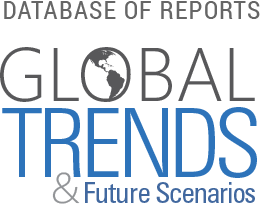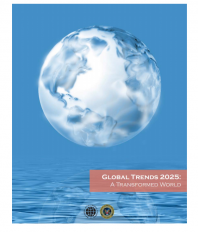
Global Trends 2025: A Transformed World

We prepared Global Trends 2025: A Transformed World to stimulate strategic thinking about the future by identifying key trends, the factors that drive them, where they seem to be headed, and how they might interact. It uses scenarios to illustrate some of the many ways in which the drivers examined in the study (e.g., globalization, demography, the rise of new powers, the decay of international institutions, climate change, and the geopolitics of energy) may interact to generate challenges and opportunities for future decisionmakers. The study as a whole is more a description of the factors likely to shape events than a prediction of what will actually happen.
By examining a small number of variables that we judge probably will have a disproportionate influence on future events and possibilities, the study seeks to help readers to recognize signposts indicating where events are headed and to identify opportunities for policy intervention to change or lock in the trajectories of specific developments. Among the messages we hope to convey are: “If you like where events seem to be headed, you may want to take timely action to preserve their positive trajectory. If you do not like where they appear to be going, you will have to develop and implement policies to change their trajectory.” For example, the report’s examination of the transition out of dependence on fossil fuels illustrates how different trajectories will entail different consequences for specific countries. An even more important message is that leadership matters, no trends are immutable, and that timely and well-informed intervention can decrease the likelihood and severity of negative developments and increase the likelihood of positive ones.
Global Trends 2025 is the fourth installment in the National Intelligence Council’s effort to identify key drivers and developments likely to shape world events a decade or more in the future. Both the product and the process used to produce it benefited from lessons learned in previous iterations. Each edition of Global Trends has tapped larger and more diverse communities of experts. Our first effort, which looked out to 2010, relied primarily on expertise within the US Intelligence Community. There was some outreach to other elements of the United States Government and the American academic community. For Global Trends 2015, we engaged more numerous and more varied groups of non-US Government experts, most of whom were American citizens.
C. Thomas Fingar
Chairman, National Intelligence Council
- Issues:
- Infrastructure, Demography, Urbanization and Migration, Economics, Global and Domestic Governance, Natural Resources
- Region:
- Global
- Year Published:
- 2008
- Institution:
- National Intelligence Council (NIC)

